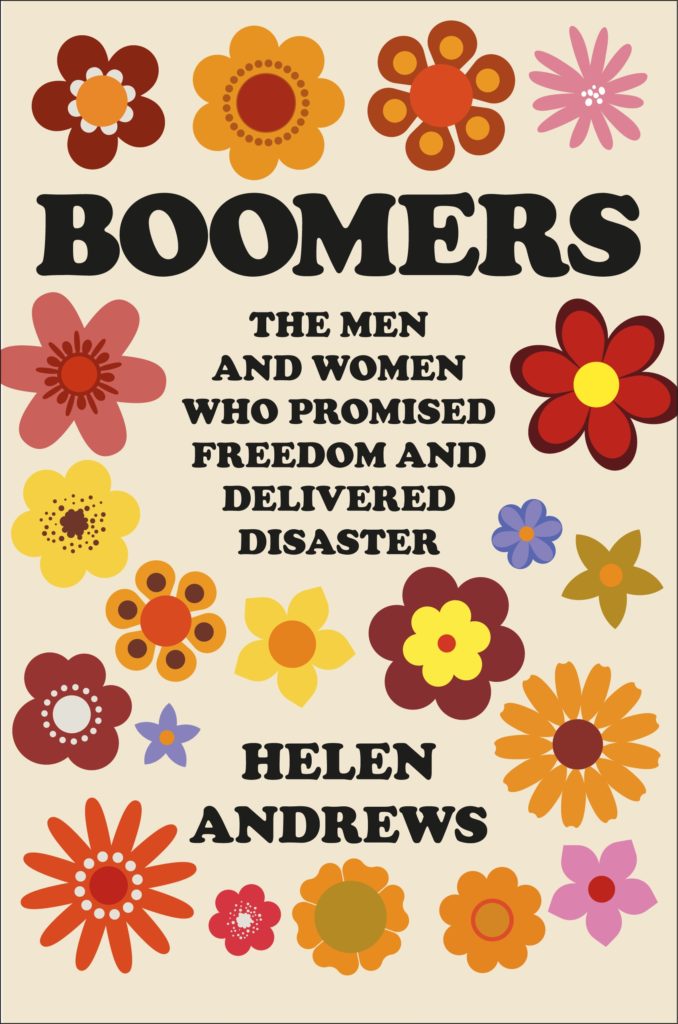Rarely do I pre-order a book, but in the case of Helen Andrews, presently the senior editor of The American Conservative and one of the brightest young writers at work today, exceptions must be made. I have long enjoyed her writing, not only on current affairs but on literary topics as well (essays on Robert Walser, George Eliot, Helen Vendler, and Charles Lamb, for example), though perhaps her best-known piece is “Shame Storm,” a personal essay she wrote in the wake of a viral public humiliation orchestrated by an ex-boyfriend. Boomers, her first book, is a broadside against an entire generation, “the men and women who promised freedom and delivered disaster,” in the mold of Lytton Strachey’s Eminent Victorians: she chooses six representative boomers – Steve Jobs, Aaron Sorkin, Jeffrey Sachs, Camille Paglia, Al Sharpton and Sonia Sotomayor – to profile, charging that their various personal failings can be found write large in their entire generation.
The first question a reader might ask is why? What have the boomers done to earn the scorn of Helen Andrews? In this respect, her timing could not have been better, for “boomer” has become a catch-all term of abuse on the internet and in the popular culture, connoting a kind of naive, out of touch and often grumpy disregard for the troubles of their children and grandchildren. “Boomers were the people who scolded us for complaining about student loan debt when, in their day, you could work off a semester’s tuition in a few shifts sweeping floors at the biology lab. They’re the parents who ask why we’re still single when their example of broken homes and sexual anarchism didn’t leave us with much to go on.” Or, in a more succinct damnation, boomers “inherited prosperity, social cohesion, and functioning institutions. They passed on debt, inequality, moribund churches, and a broken democracy.” You certainly won’t gain this perspective in school, where a government-sanctioned curriculum has made the 1960s the pivotal point in human history, before which there was nothing but misery and oppression (“Before the Renaissance, would-be discoverers of Aristotle were sometimes told by zealous churchmen that anything written before Christ was ipso facto not worth rediscovering. This is approximately how the boomers feel about themselves”). Andrews, it should be said, has a talent for pouring scorn, and her witticisms elevate her criticism and the reader’s enjoyment, but they also at times distract from her purpose. In between bon mots, we get the following: “The baby boomers have been responsible for the most dramatic sundering of Western civilization since the Protestant Reformation.” It is, effectively, her thesis, and it’s a doozy.
How is it possible that the flower-children of the 1960s could perpetrate a cultural unravelling to equal or even surpass the Protestant Reformation? After all, they did not burn churches or destroy relics or hunt down practicing Catholics. Rather, they took aim at something more fundamental than the outward trappings of faith: they dismantled the cultural, philosophical and social understanding that made churches necessary. The boomers, Andrews charges, used their demographic might to bully and cajole society until it had remade itself to suit their immediate needs and purposes. Consider Camille Paglia, a great scholar of antiquity but also a champion of popular culture. Andrews takes her to task for her refusal to acknowledge the dangers unleashed by the sexual revolution – dangers that, Andrews charges, Paglia had first-hand experience of, having witnessed the bathhouse era of gay liberation give rise to the AIDS epidemic.
Again and again Paglia has seen her rosy expectations of human sexuality run aground on harsh facts. “During the Sxities sexual revolution, I believed that, in a reformed future, prostitution would be unnecessary, since emancipated female desire would expand to meet men’s needs.” She concedes that things have not quite worked out that way. This has in no way diminished her enthusiasm for prostitution as something worth not only legalizing but positively defending. She sometimes sees streetwalkers on her way to work in Philadelphia in the early morning: “‘Pagan Goddess!’ I want to call out, as I sidle reverently by.” Individual disillusionments pile up, and still her basic optimism is untouched.
The kind of egoism that blinds Paglia to the plight of a street-walking prostitute – no sane person’s vision of a goddess – is a common thread linking all of the people profiled here, from the developmental economist Jeffrey Sachs, whom Andrews accuses of behaving exactly like a colonial power in his top-down direction of foreign countries, albeit without the accountability and on-the-ground experience of the more nakedly honest imperialists, to Al Sharpton, whose stewardship of the civil rights movement he inherited by default transformed it from a grass-roots, democratic mass movement into a privatized, corrupted and for-profit interest group, with little authentic connection to the people it purports to represent.
There is an edge to Boomers, as there is to so much of Andrews’ writing, but there is also much comedy and wisdom here as well, and an erudition that belies her young age. And though she is withering in her scorn, she isn’t unfair to her subjects, many of whom she clearly admires. Lytton Strachey’s Eminent Victorians taught a generation of Britains that their Victorian ancestors were not above reproach, nor even responsibility for the mess of World War I. Today, the younger generations are beginning to take stock of the world they are inheriting and the shallow lives that have been prepared for them, and the response has been understandably angry. If that anger is ever to be harnessed to something positive, something productive, Andrews’ book offers a helpful map back towards sanity. If, on the other hand, that anger is left unchecked, if our societies do not course correct, then the boomers will have much more to fear than Helen Andrews.
